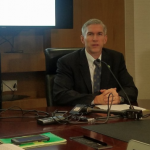
In wake of the ExxonMobil company raising concern about some of the new provisions in the updated Production Sharing Agreement for future oil blocks, Second Vice President Bharrat Jagdeo on Thursday said the Government will not “water down” the new model Petroleum Sharing Agreement (PSA) to suit the ExxonMobil Guyana company, making it clear that no significant changes will be made to the new model agreement.
ExxonMobil is among companies that have submitted bids for 8 of the 14 oil blocks that were put up for public auction, but its President Alistair Routledge made it clear on Tuesday that the oil giant will not sign the new model agreement in its current form due to a number of non-fiscal measures he said are simply not attractive.
However, Mr. Jagdeo said the Government will not “weaken” the new PSA to suit Exxon.
“I am not saying that it is hard and fast, and there will be nothing, like minor things changed when we get to the contracting stage but not the core terms, not the core terms, not the fiscal terms. Those fiscal terms are settled. We are not going to weakened the PSA to suit ExxonMobil, the new PSA. So, if they don’t want to sign it, fine, they don’t need to sign it,” Jagdeo told reporters on Thursday.
Noting that times have changed, Jagdeo said this is not the era when a company such as Exxon would be allowed to draft its own contract and have it approved by Cabinet. He alleged that such was the case in 2016 when the Stabroek Block PSA was revised.
“The Clyde and Company Report showed that the draft, the first draft of the Cabinet paper was produced by Exxon and then, Trotman and others took that to Cabinet. This is a new government, a different dispensation. So, if they believe that they were sweetened by that approach, well it is not going to happen now,” the Second Vice President said.
Under the new model PSA, the royalty on all petroleum produced and sold by the contractor has been increased from 2%, as embedded in the Stabroek Block PSA, to 10%. It includes the retention of the 50-50 profit-sharing after cost recovery, however, a company would not be able to recover more than 65% of the cost at a time. But Exxon has taken issue with the non-fiscal measures including the time periods for relinquishments.

The Second Vice President said the model PSA was finalized following extensive consultation and advice from an international firm versed in Oil and Gas.
“Let me make it clear that we went through a public process to finalize the new PSA and Petroleum Activities Bill. We had these drafted by a group – IHS Markit – that has international expertise in the Oil and Gas Sector. They are very familiar with the regime – the fiscal regimes as well as relinquishment regimes in other parts of the world,” he said.
He said it was the recommendation of the firm that the country strengthens a number of lax provisions found in the Stabroek Block PSA including the provisions governing relinquishment of blocks in keeping with international standards.
He said the oil company cannot expect that the Government will wholeheartedly accept all of its recommendations and include them in the PSA.
Meanwhile, responding to criticism that the Natural Resources Ministry lacks capacity to execute its mandate both under the PSA and Laws, Jagdeo said Exxon should focus on fulfilling its responsibility and providing the necessary data, and the Government will do its part of build capacity.













You must be logged in to post a comment Login